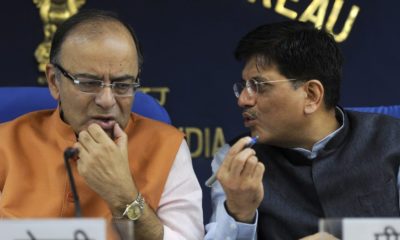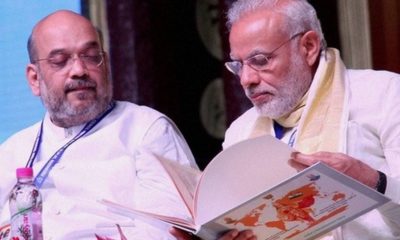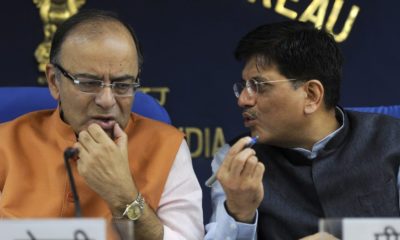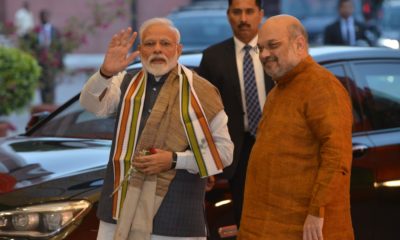Feature
Coal India unions call off strike

New Delhi: Major trade unions representing state-run Coal India’s (CIL) workers have called off a strike planned for Monday to protest a stake sale and e-auction of cancelled coal blocks proposed by an ordinance with a provision for commercial mining by private companies.
Following a meeting of union leaders with offcials of the coal ministry here Saturday, secretary general of the Indian National Mineworkers Federation S.Q. Zama said the strike has been postponed pending a meeting with Coal Minister  . The date of the meeting with the minister has, however, not not been decided yet.
. The date of the meeting with the minister has, however, not not been decided yet.
Zama said the unions would keep resisting any move that could undermine the position of Coal India, and added that competition from private companies would make CIL a sick company, risking the jobs of most of its 370,000 workers.
“The government might try to bulldoze us because of their strength in parliament, but we will put up resistance to the extent possible,” Zama said.
The All India Trade Union Congress has said the coal ordinance could be used “as a backdoor entry for taking over the entire coal sector by the private corporates”.
AITUC general secretary Gurudas Dasgupta had said that if a vital national resource was privatised, “national interest will be jeopardised and Coal India will be weakened”.
Describing the government’s move to reallocate the blocks by e-auction as “not at all a welcome decision”, the Centre of Indian Trade Unions (CITU) has said it condemns any move to nullify the Coal Nationalisation Act.
“The CITU opposes any move for denationalisation of coal industry and calls upon the workers and the trade union movement to unitedly resist such disastrous move of allowing commercial mining by private entities at the initiation stage itself,” CITU said in a statement.
“The CITU also urges government to reconsider its decision to auction those coal blocks again to private entities and instead vest all of them to Coal India,” it said.
All India Coal Workers Federation (AICWF) general secretary Jibon Roy said that if the government implemented any enabling provision allowing commercial mining by private companies, the coal workers may proceed on a nationwide strike.
The ordinance has been brought in to resolve issues arising out of the Supreme Court cancelling allocations of 214 coal blocks last month.
Entertainment
Meghalaya Reserves Legalized Gambling and Sports Betting for Tourists

The State Scores Extra High on Gaming-Friendly Industry Index
Meghalaya scored 92.85 out of 100 possible points in a Gaming Industry Index and proved to be India’s most gaming-friendly state following its recent profound legislation changes over the field allowing land-based and online gaming, including games of chance, under a licensing regime.
The index by the UK India Business Council (UKIBC) uses a scale of 0 to 100 to measure the level of legalisation on gambling and betting achieved by a state based on the scores over a set of seven different games – lottery, horse racing, betting on sports, poker, rummy, casino and fantasy sports
Starting from February last year, Meghalaya became the third state in India’s northeast to legalise gambling and betting after Sikkim and Nagaland. After consultations with the UKIBC, the state proceeded with the adoption of the Meghalaya Regulation of Gaming Act, 2021 and the nullification of the Meghalaya Prevention of Gambling Act, 1970. Subsequently in December, the Meghalaya Regulation of Gaming Rules, 2021 were notified and came into force.
All for the Tourists
The move to legalise and license various forms of offline and online betting and gambling in Meghalaya is aimed at boosting tourism and creating jobs, and altogether raising taxation revenues for the northeastern state. At the same time, the opportunities to bet and gamble legally will be reserved only for tourists and visitors.
“We came out with a Gaming Act and subsequently framed the Regulation of Gaming Rules, 2021. The government will accordingly issue licenses to operate games of skill and chance, both online and offline,” said James P. K. Sangma, Meghalaya State Law and Taxation Minister speaking in the capital city of Shillong. “But the legalized gambling and gaming will only be for tourists and not residents of Meghalaya,” he continued.
To be allowed to play, tourists and people visiting the state for work or business purposes will have to prove their non-resident status by presenting appropriate documents, in a process similar to a bank KYC (Know Your Customer) procedure.
Meghalaya Reaches Out to a Vast Market
With 140 millions of people in India estimated to bet regularly on sports, and a total of 370 million desi bettors around prominent sporting events, as per data from one of the latest reports by Esse N Videri, Meghalaya is set to reach out and take a piece of a vast market.
Estimates on the financial value of India’s sports betting market, combined across all types of offline channels and online sports and cricket predictions and betting platforms, speak about amounts between $130 and $150 billion (roughly between ₹9.7 and ₹11.5 lakh crore).
Andhra Pradesh, Telangana and Delhi are shown to deliver the highest number of bettors and Meghalaya can count on substantial tourists flow from their betting circles. The sports betting communities of Karnataka, Maharashtra, Uttar Pradesh and Haryana are also not to be underestimated.
Among the sports, cricket is most popular, registering 68 percent of the total bet count analyzed by Esse N Videri. Football takes second position with 11 percent of the bets, followed by betting on FIFA at 7 percent and on eCricket at 5 percent. The last position in the Top 5 of popular sports for betting in India is taken by tennis with 3 percent of the bet count.
Local Citizens will Still have Their Teer Betting
Meghalaya residents will still be permitted to participate in teer betting over arrow-shooting results. Teer is a traditional method of gambling, somewhat similar to a lottery draw, and held under the rules of the Meghalaya Regulation of the Game of Arrow Shooting and the Sale of Teer Tickets Act, 2018.
Teer includes bettors wagering on the number of arrows that reach the target which is placed about 50 meters away from a team of 20 archers positioned in a semicircle.
The archers shoot volleys of arrows at the target for ten minutes, and players place their bets choosing a number between 0 and 99 trying to guess the last two digits of the number of arrows that successfully pierce the target.
If, for example, the number of hits is 256, anyone who has bet on 56 wins an amount eight times bigger than their wager.























